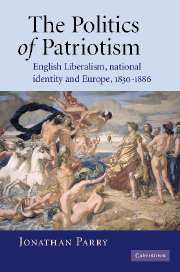Book contents
- Frontmatter
- Contents
- Acknowledgments
- Introduction
- PART I ENGLISH LIBERALISM AND NATIONAL IDENTITY
- 1 The English constitution and the liberal state
- 2 Character, morals and national identity
- PART II EUROPE AND LIBERAL POLITICS
- Conclusion: Liberalism, state and nation
- Abbreviations and select bibliography
- Index
2 - Character, morals and national identity
Published online by Cambridge University Press: 17 July 2009
- Frontmatter
- Contents
- Acknowledgments
- Introduction
- PART I ENGLISH LIBERALISM AND NATIONAL IDENTITY
- 1 The English constitution and the liberal state
- 2 Character, morals and national identity
- PART II EUROPE AND LIBERAL POLITICS
- Conclusion: Liberalism, state and nation
- Abbreviations and select bibliography
- Index
Summary
For most propertied and intellectual Liberals a crucial issue in the franchise debates was whether certain virtues – morality, self-restraint, public spirit, manliness, conscience – could be spread sufficiently widely to make a success of a broad suffrage. On the whole, they claimed to be optimistic about this, even if many of them were not always optimistic enough to agitate for an immediate further extension of the suffrage. Between 1850 and the 1880s there were many celebratory statements about the self-reliance and self-discipline of English national character. The general view was that the English talent for self-government had been shaped by generations of conditioning from a respected system of law and institutions. The common recognition of a patria, a community of structures, practices and values, had helped to train human faculties to accept civic responsibility. However, this praise of the English character should not be taken strictly at face value. Most of the discussions about the qualities necessary for good government were themselves intended partly to educate people into those characteristics – to teach virtue by example, and to create a national debate about the best qualities to instil. One significant concern of Liberal government was the improvement of character, and its protection from corrupting elements, many of which were seen as alien.
The main purpose of this chapter is to discuss some of the most influential Liberal approaches to the role that politics should play in sustaining the nation's morals.
- Type
- Chapter
- Information
- The Politics of PatriotismEnglish Liberalism, National Identity and Europe, 1830–1886, pp. 86 - 126Publisher: Cambridge University PressPrint publication year: 2006

